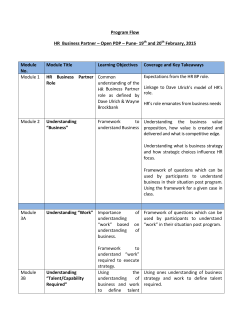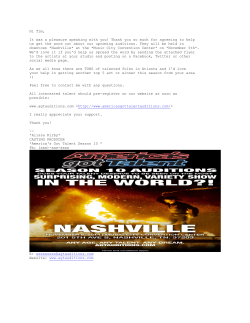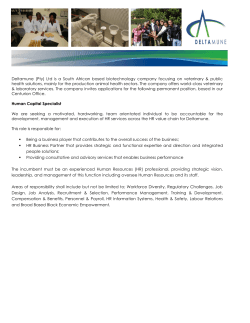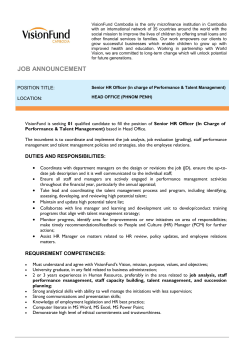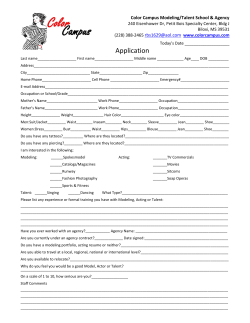
Talent Strategies
2015 SGA Management Conference Talent Acquisition For Technical Roles and Veterans April 17, 2015 © 2013 The Williams Companies, Inc. All rights reserved. 2015 Management Conference - SGA Session Overview Kerry Clapp –VP Volume Management Industry Talent Outlook Challenges facing companies related to the talent gap and the increasing importance on attracting, retaining and engaging qualified talent Sloan Yates – Manager, Talent Acquisition Workforce planning initiatives Discuss four key strategies to talent acquisition Provide overview on historical JMO and technical recruiting strategies Roundtable Discussion 2 Presentation name (edit footer in slide master pages) | 1/1/13 © 2013 The Williams Companies, Inc. All rights reserved. 2015 Management Conference - SGA Talent Outlook for the Oil & Gas Industry The Oil & Gas industry is suffering from two main issues in terms of human capital resulting in a Talent Gap for many companies The industry in affected by a shortage of skilled staff specifically in engineering and technical roles A large number of experienced employees will retire leaving a significant gap in experience Key features of the Talent Gap Industry growth resulting in Increased demand for highly specialized and experienced jobs Supply constraints / limited number of skilled candidates in the market Increased rivalry among companies competing for qualified and high performing talent Rising technical complexity Attrition is rising and qualified employees are increasingly difficult to attract and retain These factors contributing to the talent gap represent significant risks to the business 3 Presentation name (edit footer in slide master pages) | 1/1/13 © 2013 The Williams Companies, Inc. All rights reserved. 2015 Management Conference - SGA Talent Outlook for the Oil & Gas Industry Most organizations are experiencing talent shortages in many of their operating areas in regions with large capital projects and a limited experience pool These talent shortages are raising significant business risks The demand for experienced talent continues to rise There are not enough skilled candidates in the market Attrition is rising and qualified employees are increasingly difficult to attract and retain 4 Presentation name (edit footer in slide master pages) | 1/1/13 © 2013 The Williams Companies, Inc. All rights reserved. 2015 Management Conference - SGA Workforce Planning Understanding staffing needs is critical to your organizations success Build an understanding of the talent gap to perform a rigorous analysis of the mismatch between supply and demand by beginning with fundamental questions What will the business look like over the next five years? How are the business’s needs changing? How many employees will the company need in each discipline, geography or functional unit? What skills must those individuals have? Address aging workforce / retirement eligible employees Flexible work schedules and mentoring programs are options to consider in addressing the aging workforce Leading companies construct scenarios based on quantitative factors related to their business and capital projects Develop a targeted recruiting strategy to address the current and future needs of the organization that is aligned with the workforce planning efforts 5 Presentation name (edit footer in slide master pages) | 1/1/13 © 2013 The Williams Companies, Inc. All rights reserved. 2015 Management Conference - SGA Recruiting Strategies Talent Acquisition (“Buy”) Contingent (“Borrow”) Recruitment Strategies Talent Development (“Build”) Talent Deployment (“Transform”) 6 Presentation name (edit footer in slide master pages) | 1/1/13 © 2013 The Williams Companies, Inc. All rights reserved. 2015 Management Conference - SGA Talent Strategies Talent Acquisition - (“buy” strategy) In a competitive job market, companies are competing for the same skillset Differentiating themselves through pay, benefits, location, development, career progression, and many others factors Contingent Workforce - (“borrow” strategy) Contract / Leased Workers (short term fix) Talent Deployment - (“transform” strategy) Automation Streamlining processes Talent Development - (“build” strategy) Long term strategy Focus on internal development Sourcing talent from industries / areas with complementary skill sets 7 Presentation name (edit footer in slide master pages) | 1/1/13 © 2013 The Williams Companies, Inc. All rights reserved. 2015 Management Conference - SGA Overcoming the Talent Gap Companies must develop a strategy based on recruiting and retaining employees. HR departments try to fill the talent gap by: Promoting and highlighting the benefits of working in the oil and gas industry Communicating efficiently with the young generation Offering competitive compensation and communicating total rewards Providing flexibility Implementing a talent development program Deploy targeted local sourcing of talent to increase retention and reduce relocation costs Supporting professionals in other sectors to make the transition to the oil and gas industry Military Technical programs 8 Presentation name (edit footer in slide master pages) | 1/1/13 © 2013 The Williams Companies, Inc. All rights reserved. Workforce Planning - Why Recruit for Military? Veterans represent one of the most underutilized talent pools in our country One of the most significant challenges our veterans face is a corporation’s inability to understand and translate the skills of military service into a meaningful private sector role,” said former Defense Secretary Robert M. Gates. It is important to recognize the challenge associated with identifying, translating and targeting military skill sets into complimentary roles within your organization 9 Collaborate with the internal and external resources to establish a base-line military candidate profile for specific roles Presentation name (edit footer in slide master pages) | 1/1/13 © 2013 The Williams Companies, Inc. All rights reserved. Fundamental Traits of a Veteran According to the U.S. Department of Labor Veteran’s Employment and Training Service, here are the top reasons to hire veterans. Integrity Leadership / Teamwork Respect for procedures Conscious of health and safety standards Technical knowledge Work Ethic - strong sense of initiative and responsibility Proven mobile workforce Accelerated learning curve Diversity Inclusion in action Efficient performance under pressure Triumph over adversity Tax Credits Background Checks and Security Clearances Government Paid Relocation Assistance 10 Presentation name (edit footer in slide master pages) | 1/1/13 © 2013 The Williams Companies, Inc. All rights reserved. Components of a Military Recruiting Program Retention Program Outreach Strategy Translate Skills Sourcing Strategy Education (Leadership, Recruiters, Hiring Manager, etc.) Identify Roles/Stakeholders Build the Business Case Source: The Value of a Veteran Presentation: “Business Case For Hiring Veterans” 11 Presentation name (edit footer in slide master pages) | 1/1/13 © 2013 The Williams Companies, Inc. All rights reserved. Military to Operations Sourcing Strategy There are military-specific and other sources where you can find veterans: Military Placement Firms Military Job Boards Military Career Fairs Military Professional Associations Military Post/Base Transition Centers Local National Guard & Reserve Units College Campuses Government Resources Social Networking Sites 12 Presentation name (edit footer in slide master pages) | 1/1/13 © 2013 The Williams Companies, Inc. All rights reserved. Military Position Profiles Consider creating a Military Position Profile for various roles to help target specific skills and experience This profile will be serve as a baseline to help educate leaders of the organization on military codes, ranks, skills, leadership and compensation levels Additionally, the Military Position Profiles will also help leaders infer skills and abilities from a veteran’s resume For example, as a sharpshooter we should understand the core values, skills and expertise this role encompasses Teamwork / Leadership Ability to carry out work with minimal supervision Deliver on highpriority objectives with minimal room for failure High pressure situations Attention to detail Working under strict deadlines Target Rank: Enlisted Target Grade: E-5 through E-7 (commensurate with the WMB operations tech pay scale) Complementary Skills: 13 Military Occupational Specialty Codes DD Form 2586 Presentation name (edit footer in slide master pages) | 1/1/13 © 2013 The Williams Companies, Inc. All rights reserved. Understanding Military Ranks The following is a description of the ranks and associated grades commonly found within various the military branches O WO NCO E 14 • Commissioned Officers - generally receive training as leadership and management generalists, in addition to training relating to their specific military occupational specialist or function in the military. A minimum of a Bachelor’s Degree. • Grades: Junior Officers O-1 through O-3; Sr. Officers O-4 through O-6; General Officers O-7 through O-10 • Warrant Officers - are rated as an Officer above the senior-most enlisted ranks, as well as Officer Cadets and candidates, but below the officer grade of O-1. Warrant officers are highly skilled, single-track specialty. (Note: The Air Force no longer has the rank of WO) • Grades: W-1 through W-5 • Non-Commissioned Officers - (usually) obtain their position of authority by promotion from the lower ranks • Grades: in the Army, Marines and Air Force, grades of E-6 and above are considered Senior NCOs, while in the Navy and Coast Guard E-7 and above are Senior NCOs • Enlisted - enlisted service personnel perform jobs specific to their own occupational specialty • Grades: E-1 through E-9 Presentation name (edit footer in slide master pages) | 1/1/13 © 2013 The Williams Companies, Inc. All rights reserved. Military Recruiting Outreach Strategy Attend selected on-base and other military job fairs at targeted bases Develop a military page on your company’s website and social media pages. To include stories of transitioning military veterans to your company, produce a recruiting video, upcoming events, etc. Complete all criteria to become a “Military Friendly Employer” 15 Presentation name (edit footer in slide master pages) | 1/1/13 © 2013 The Williams Companies, Inc. All rights reserved. Military to Operations Program Veteran Transition Training Consider a rotational program to transition and provide veterans with a foundational understanding of the Oil & Gas Industry, the culture and business of your company and introductions into various disciplines For Example: A four week curriculum focusing on the following: Week 1 - Welcome / Onboarding Oil and Gas Industry 101 Week 2 - EHS and Compliance Environmental, Health and Safety Standards and Compliance Week 3 - Business Skills Business Acumen, Writing / Soft Skills, Leadership Week 4 - Operations / Facility Exposure Day 1 - Measurement Day 2 - Instrumentation and Electrical Day 3 - Compression Operations Day 4 - Facilities Operations Day 5 - Pipeline Operations 16 Presentation name (edit footer in slide master pages) | 1/1/13 © 2013 The Williams Companies, Inc. All rights reserved. Incentives Veterans Opportunity to Work (VOW) Act of 2011 Tax credit of up to $5,600 for hiring veterans who have been looking for a job for more than six months, as well as a $2,400 credit for veterans who are unemployed for more than 4 weeks, but less than 6 months Tax credit of up to $9,600 for hiring veterans with service-connected disabilities who have been looking for a job for more than six months. Returning Heroes / Wounded Warrior Tax Credits for each Veteran hired If hired through VA Vocational Rehabilitation Program, VA picks up 50% of first six month's salary Reduced Training and Recruitment Costs Public Relations 17 Presentation name (edit footer in slide master pages) | 1/1/13 © 2013 The Williams Companies, Inc. All rights reserved. 2015 Management Conference - SGA Roundtable Are other SGA member companies experiencing a talent gap? If so, in what areas? What are some of the challenges you face with attracting this talent? Have you implemented specific programs to help curb attrition? If so, what are some of the programs? Flexible schedules? Stock grants for employees? Development programs Is your organization investing internally in their talent? How is this investment measured? Does anyone have a military / veteran program? Do you see the value of hiring veterans? What roles are you specifically targeting? Do you recruit from bases or utilize military placement firms? Do you currently or do you plan to partner with any technical schools to help develop curriculum that will support your business needs? 18 Presentation name (edit footer in slide master pages) | 1/1/13 © 2013 The Williams Companies, Inc. All rights reserved.
© Copyright 2025
